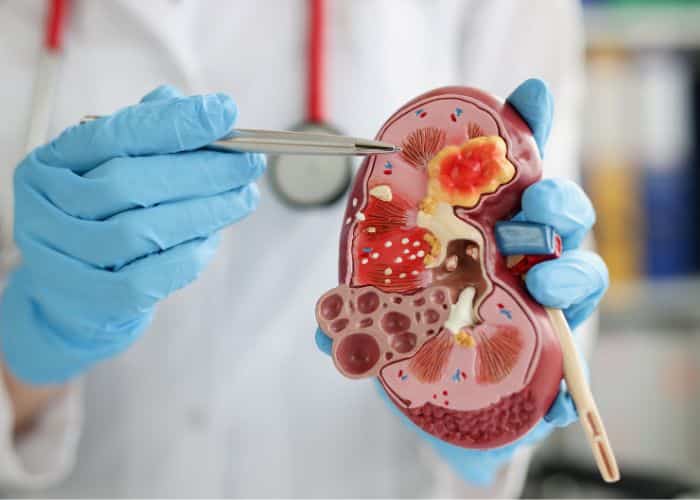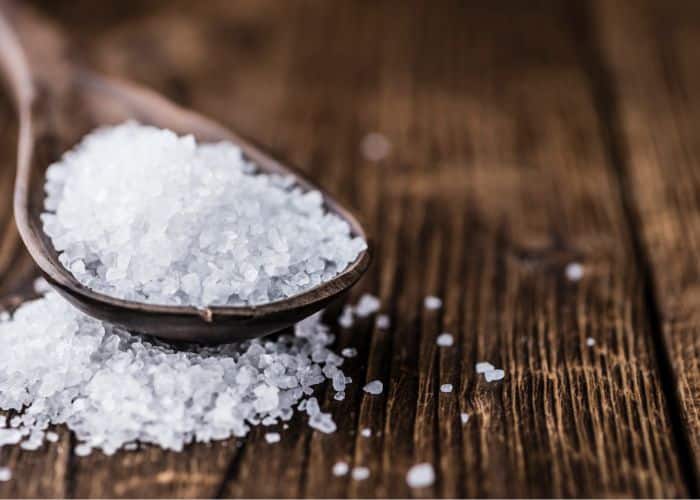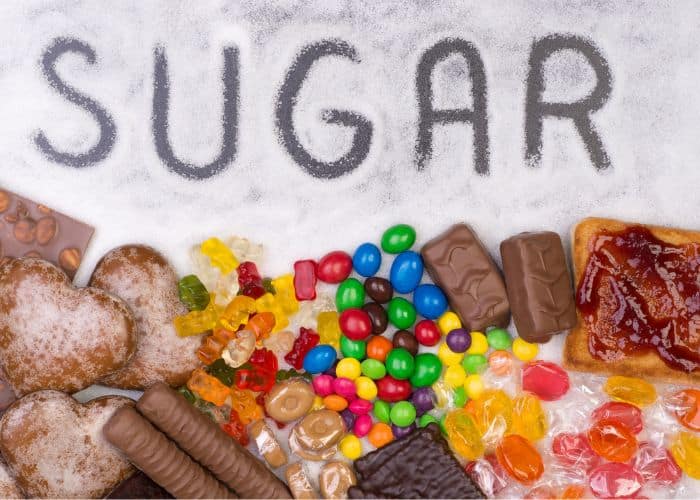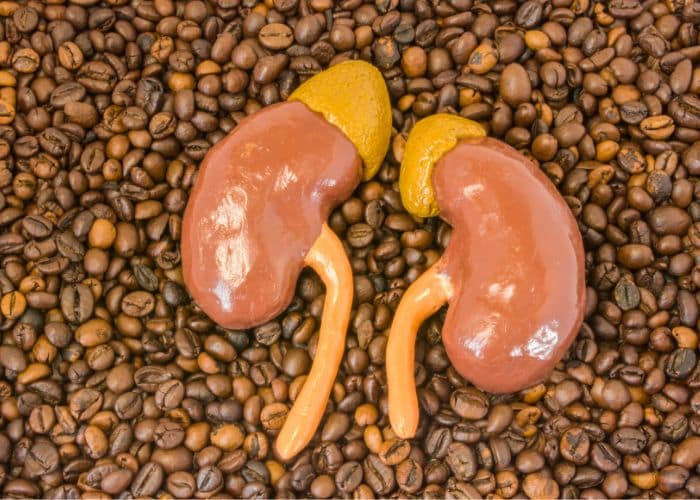Kidney stones are a common health condition that affects millions of people worldwide. While there are several causes of kidney stones, diet is one of the most significant factors that contribute to their formation. Certain foods and beverages can increase the risk of developing kidney stones, while others can help prevent them. In this article, we will explore the link between diet and kidney stones, and which foods to avoid or include in your diet to reduce your risk of developing this painful condition.
Kidney stones are hard deposits made of minerals and salts that form in your kidneys and can cause severe pain when they pass through your urinary tract. The most common type of kidney stones is made of calcium oxalate, a compound found in many foods. However, other types of stones can form due to different causes, such as uric acid stones caused by a high-protein diet or struvite stones caused by urinary tract infections. Therefore, it is essential to understand which foods and nutrients can increase or decrease your risk of developing kidney stones, depending on the type of stone you are prone to.
Contents
Understanding Kidney Stones

Kidney stones are hard deposits that form in the kidneys and can cause severe pain when they pass through the urinary tract. These stones can be caused by a variety of factors, including genetics, dehydration, and certain dietary habits.
The most common type of kidney stone is made up of calcium oxalate. Other types include uric acid, struvite, and cystine stones. Depending on the type of stone, dietary changes may be recommended to prevent future stone formation.
Dehydration is a major risk factor for kidney stone formation. When there is not enough fluid in the body, urine becomes more concentrated, which can lead to the formation of crystals that can eventually become stones. Drinking plenty of water and staying hydrated is one of the most important steps in preventing kidney stones.
Certain foods can also increase the risk of kidney stone formation. Foods high in oxalate, such as spinach, rhubarb, and almonds, can contribute to the formation of calcium oxalate stones. Animal protein, sodium, and sugar-sweetened beverages are also associated with an increased risk of kidney stones.
On the other hand, consuming a diet rich in fruits and vegetables, low in animal protein and sodium, and high in water and other fluids can help prevent kidney stones. Calcium-rich foods, such as dairy products, can also be included in a kidney stone prevention diet, despite common misconceptions that calcium should be avoided.
In summary, kidney stones can be caused by a variety of factors, including genetics, dehydration, and certain dietary habits. Drinking plenty of water and consuming a diet rich in fruits and vegetables, low in animal protein and sodium, and high in water and other fluids can help prevent kidney stone formation.
Dietary Factors That Contribute to Kidney Stones
Kidney stones are small, hard deposits that form in the kidneys and cause severe pain when they pass through the urinary tract. While there are many factors that contribute to the formation of kidney stones, dietary habits play a significant role. Here are some of the dietary factors that can increase the risk of developing kidney stones:
High Sodium Intake

A diet high in sodium can increase the amount of calcium in the urine, which can lead to the formation of calcium-based kidney stones. Sodium is found in many processed foods, such as canned soups and vegetables, deli meats, and fast food. To reduce the risk of kidney stones, it is recommended to limit sodium intake to less than 2,300 milligrams per day.
Excessive Animal Protein
Consuming a diet high in animal protein can increase the level of uric acid in the urine, which can lead to the formation of uric acid stones. Animal protein is found in meat, poultry, fish, and dairy products. To reduce the risk of kidney stones, it is recommended to limit the intake of animal protein to less than 6 ounces per day.
High Oxalate Foods
Oxalate is a substance found in many foods that can bind with calcium in the urine and form calcium oxalate kidney stones. Foods high in oxalate include spinach, rhubarb, almonds, cashews, and cocoa powder. To reduce the risk of kidney stones, it is recommended to limit the intake of high oxalate foods and to drink plenty of fluids to help flush out any excess oxalate.
Low Fluid Intake
Not drinking enough fluids can lead to concentrated urine, which can increase the risk of kidney stone formation. It is recommended to drink at least 8 cups of water per day, and more if you are physically active or live in a hot climate. Other fluids that can help prevent kidney stones include lemonade and orange juice, as they contain citrate, which can help prevent the formation of calcium-based kidney stones.
In conclusion, dietary habits play a significant role in the formation of kidney stones. By limiting sodium intake, animal protein, and high oxalate foods, and by drinking plenty of fluids, you can reduce your risk of developing kidney stones.
The Role of Calcium in Kidney Stone Formation
Calcium is an essential mineral that plays a vital role in maintaining healthy bones and teeth. However, when calcium levels in the body become too high, it can lead to the formation of kidney stones. Kidney stones are solid masses that form in the kidneys when there are high levels of certain substances, such as calcium, oxalate, cystine, or phosphate, and too little liquid.
Contrary to popular belief, reducing calcium intake does not necessarily prevent kidney stones. In fact, low-calcium diets may increase the risk of developing kidney stones. This is because calcium binds with oxalate in the intestine, reducing the amount of oxalate that is absorbed into the bloodstream and excreted in the urine. When there is not enough calcium in the diet, oxalate levels in the urine can increase, leading to the formation of kidney stones.
However, it is important to note that not all types of calcium are equal when it comes to kidney stone formation. Calcium oxalate is the most common type of kidney stone, and it forms when there is too much oxalate in the urine. Foods that are high in oxalate, such as spinach, rhubarb, and almonds, can contribute to the formation of calcium oxalate stones.
In summary, while it may seem counterintuitive, consuming adequate amounts of calcium is essential for preventing kidney stones. However, it is important to choose calcium-rich foods that are low in oxalate to reduce the risk of calcium oxalate stone formation.
How Sugar Affects Kidney Stones

Sugar is one of the most commonly consumed substances in the modern diet. It is found in many processed foods, soft drinks, and sweets. However, consuming too much sugar can lead to various health problems, including kidney stones.
Sugar, particularly fructose, is known to increase the risk of kidney stones. When we consume too much sugar, it can cause an increase in insulin levels, which in turn can lead to an increase in the amount of calcium in the urine. This excess calcium can combine with other substances in the urine, such as oxalate, to form kidney stones.
Furthermore, sugar can also cause dehydration, which is another risk factor for kidney stones. When we consume too much sugar, our body needs more water to process it. This can lead to a decrease in urine output and an increase in the concentration of substances that can form kidney stones.
To reduce the risk of kidney stones, it is recommended to limit the intake of added sugars in the diet. This includes avoiding sugary drinks, sweets, and processed foods. Instead, opt for whole foods that are naturally low in sugar, such as fruits and vegetables.
It is also important to stay hydrated by drinking plenty of water throughout the day. This can help to flush out any substances that may contribute to the formation of kidney stones.
Overall, while sugar may be a tempting treat, it is important to consume it in moderation to reduce the risk of kidney stones and other health problems.
Alcohol and Kidney Stones
Alcohol consumption has been linked to an increased risk of kidney stones. Drinking alcohol can lead to dehydration, which can cause the urine to become more concentrated and increase the risk of kidney stone formation. Additionally, alcohol can increase the level of uric acid in the body, which can contribute to the formation of uric acid stones.
According to the American Addiction Centers, alcohol can also interfere with the body's ability to absorb and use calcium, which can lead to the formation of calcium oxalate stones. These stones are the most common type of kidney stone and are formed when calcium combines with oxalate in the urine.
It is important to note that not all types of alcohol have the same effect on kidney stone formation. Beer and wine have been shown to increase the risk of kidney stones more than other types of alcohol. This is because beer and wine contain purines, which are broken down into uric acid in the body.
To reduce the risk of kidney stones, it is recommended to limit alcohol consumption and stay hydrated by drinking plenty of water. It is also important to follow a healthy diet that is low in sodium, animal protein, and oxalate. Consuming more citrus fruits and vegetables can also help prevent kidney stone formation.
Here is a summary of how alcohol affects kidney stone formation:
- Alcohol can cause dehydration, which can increase the risk of kidney stone formation.
- Alcohol can increase the level of uric acid in the body, which can contribute to the formation of uric acid stones.
- Beer and wine contain purines, which can be broken down into uric acid in the body and increase the risk of kidney stone formation.
- To reduce the risk of kidney stones, it is recommended to limit alcohol consumption, stay hydrated, and follow a healthy diet that is low in sodium, animal protein, and oxalate.
The Impact of Caffeine on Kidney Stones

Caffeine is a widely consumed stimulant found in coffee, tea, soda, and energy drinks. Some studies suggest that caffeine intake may increase the risk of developing kidney stones, while others suggest that it may have a protective effect. So, what is the impact of caffeine on kidney stones?
According to a study published in the National Library of Medicine, caffeine intake may increase urine calcium excretion, which is a risk factor for kidney stone formation. However, another study using genetic data of hundreds of thousands of people found that daily coffee and caffeine consumption can prevent kidney stones.
It is important to note that the effect of caffeine on kidney stones may depend on the individual's overall diet and lifestyle. For example, consuming high amounts of sugar-sweetened beverages may increase the risk of kidney stones, while consuming coffee or tea in moderation may have a protective effect.
In addition, some studies suggest that caffeine may affect the absorption of certain minerals, such as calcium and magnesium, which are important for preventing kidney stone formation. However, more research is needed to determine the exact mechanism by which caffeine affects kidney stone formation.
Overall, while the impact of caffeine on kidney stones is still unclear, it is important to maintain a balanced and healthy diet to reduce the risk of kidney stone formation. This includes consuming plenty of water, limiting intake of sugar-sweetened beverages, and consuming caffeine in moderation.
Conclusion
In conclusion, there are several dietary factors that can influence the formation of kidney stones. Foods high in oxalate, animal protein, and sodium can increase the risk of developing kidney stones, while a diet high in fruits and vegetables, low in animal proteins, balanced in low-fat dairy products, and with a reduced salt content is the best way to decrease the risk of kidney stones.
Calcium oxalate stones are the most common type of kidney stone, and it is important to note that reducing calcium intake is not recommended for preventing these stones. In fact, keeping calcium-rich foods in your diet can actually help prevent these stones from forming. However, taking large amounts of calcium supplements can increase the risk of developing calcium oxalate stones.
It is also important to stay hydrated and maintain a healthy weight to prevent kidney stones. Drinking plenty of water throughout the day can help dilute urine and prevent the formation of crystals that can lead to stones. Obesity and a high body mass index (BMI) have been linked to an increased risk of kidney stones, so maintaining a healthy weight is important.
Overall, making dietary changes to prevent kidney stones is an effective and natural way to reduce the risk of developing this painful condition. By following a diet that is low in oxalate, animal protein, and sodium, and high in fruits and vegetables, low-fat dairy, and water, you can help prevent the formation of kidney stones and maintain good kidney health.
Frequently Asked Questions
What are some recommended foods to eat when dealing with kidney stones?

If you have kidney stones, it is important to drink plenty of fluids, especially water. Citrus fruits and their juices, such as lemons and oranges, can also help reduce the risk of kidney stone formation due to their high citrate content. Other recommended foods include low-fat dairy products, whole grains, and lean proteins like chicken and fish.
What vegetables should be avoided if you have kidney stones?
Vegetables that are high in oxalate, such as spinach, rhubarb, and beets, should be avoided or limited if you have kidney stones. However, it is still important to eat a variety of vegetables for overall health, so talk to your doctor or a registered dietitian about how to incorporate low-oxalate vegetables into your diet.
Is there a specific diet that can help prevent calcium oxalate kidney stones?
If you have calcium oxalate kidney stones, you may benefit from a low-oxalate diet. This means avoiding or limiting high-oxalate foods like spinach, rhubarb, and nuts, as well as reducing your intake of animal protein and sodium. You may also need to increase your intake of calcium-rich foods, as calcium can help bind with oxalate in the digestive system and prevent it from being absorbed into the bloodstream.
Are there any foods that can help clear kidney stones?
While there is no one food that can cure kidney stones, some studies suggest that certain foods and beverages may help prevent or reduce the risk of stone formation. For example, research has found that drinking plenty of water, lemonade, and other citrus juices can help increase urine volume and reduce the concentration of stone-forming substances. Additionally, some studies suggest that eating foods high in potassium, such as bananas and avocados, may help reduce the risk of kidney stones.
Does drinking coffee increase the risk of developing kidney stones?
While some studies have suggested that caffeine may increase the risk of kidney stones, the evidence is not conclusive. Some research has found that moderate coffee consumption may actually have a protective effect against kidney stone formation. However, if you have a history of kidney stones or are at risk for developing them, it may be best to limit your caffeine intake and talk to your doctor about whether coffee is safe for you.
What beverages should be avoided when dealing with kidney stones?
If you have kidney stones, it is important to avoid beverages that are high in sugar or artificial sweeteners, as well as those that are high in oxalate, such as tea and certain fruit juices. Alcohol and carbonated beverages should also be limited, as they can increase the risk of dehydration and potentially contribute to stone formation.






